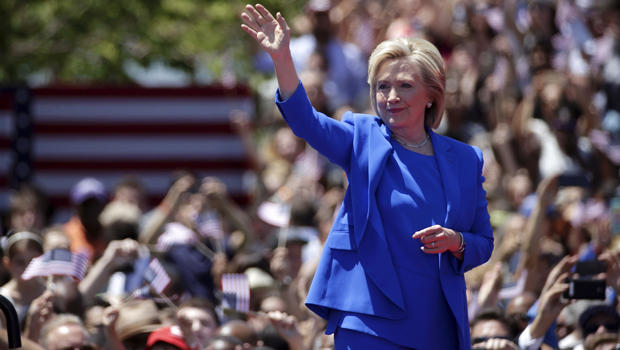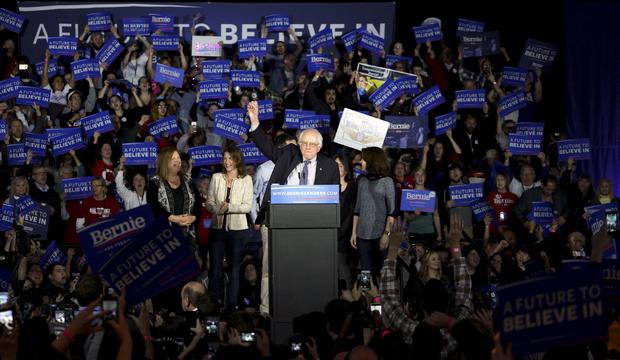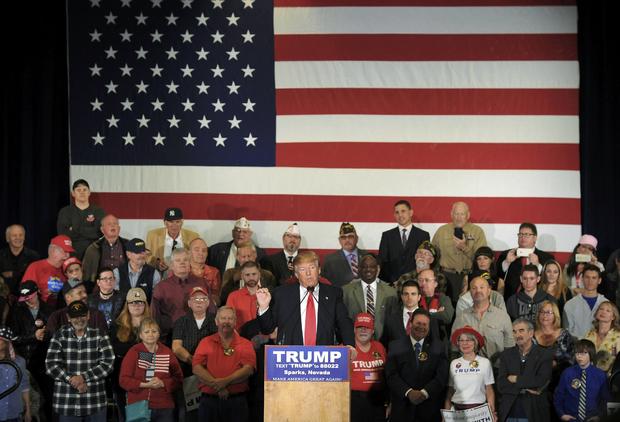What can we learn from the way presidential candidates talk?
The adage "it's not what you say--it's how you say it" might well apply to presidential politicians, too, suggests a recent study by a UCLA vocal scientist.
Dr. Rosario Signorello analyzed the voice qualities of three of the 2016 presidential contenders and found that in spite of their vast material differences, there are characteristics in their speech that are very similar.
"The most interesting and striking findings were about the similarities that we found across the two genders and the two political parties in their voices," he told CBS News. Donald Trump, Hillary Clinton and Bernie Sanders adjust certain qualities in their voices in nearly the same ways when they're trying to talk to certain types of audiences, Signorello observed, in three separate audio samples from the candidates.
Presidential candidates, for example, tend to use what Signorello describes as a "wide vocal pitch," that is, speakers broaden their vocal frequency range from very low to very high. When they do this, they exceed the acoustical limits typically used in conversational voice--in environments where the audience's makeup is very diverse -- often the case at political rallies. This strategy, Signorello says, creates an inclusive and welcoming atmosphere to all subgroups who may be in attendance.
On the other hand, when politicians are addressing people who are similar to them in terms of leadership or professional rank, they tend to speak at more stable and lower pitched frequencies--which Signorello describes as a "narrow vocal pitch." High-ranking officials rely on these speaking habits where they're trying to assert their dominance and authority, among other heads of states, for example.
In this video (also shown above), listen to the clips that Signorello analyzed -- the examples he listened to are cited below:
Hillary Clinton, campaign launch, June 13, 2015 in New York City
"She doesn't expect anything to come easy but she did ask me, 'What more can be done so it isn't quite so hard for families like hers?'"
Signorello homed in Clinton's description of a single mom she'd recently met who was struggling to hold onto her job, attend community college and raise three children. In this instance, Signorello refers to a phenomenon called "vocal fry." It's a speech pattern described variously as a "croak" or a "creak" in the voice that has become more common especially in the vocal patterns of young women -- among the most common users are the Kardashians. Here's what it sounds like.
In Clinton's case, Signorello notes that she decreases her vocal pitch frequency dramatically in the first part of the sentence, when she's talking about the woman's struggles. "She changes her voice quality from modal (i.e., normal) to quite harsh and decreases dramatically the pitch frequency and uses vocal fry when she says "hard" in this sentence," he said. The lower pitch sends a message of authority, of being in charge, and the vocal fry augments the negative emotion.
Bernie Sanders, Iowa Caucus speech, February 1, 2016
"The greed, the recklessness and the illegal behavior of Wall Street drove this economy to its knees."
Sanders' speech patterns have widely been noted, even to the point of self-parody by Sanders. "Yuuuge," he says with added emphasis, acknowledging the frequent impressions of his pronunciation of "huge." In the example above, after his loss on Iowa caucus night, Signorello explained why Sanders tends to elongate the word "illegal," and why he often also elongates "huge" and "recklessness" -- linguists say it's a common vocal strategy.
"Sanders uses a phenomenon called 'hyper articulation,' which is the exaggeration of the pronunciation," he said. "The exaggeration of the pronunciation has a clear aim to highlight those key words."
Signorello further hypothesized that Sanders is using hyper articulation to affirm the novelty of his very liberal arguments--exaggerating the contrast in his political agenda from that of his opponents--as well as to draw his listeners' attention to what he believes are the key differences.
Donald Trump: Rally in Sparks, Nevada, February 23, 2016
"I love those people. They're my people, I love them. And I won with less than highly [educated people]."
Trump's address demonstrates frequent changes in pitch: he balances a low-pitched voice to project dominance and authority with a high-pitched voice communicating relatability and compassion. By alternating between high and low pitched voices, candidates are able to satisfy every listener's idea of how a "charismatic leader" should sound.
In the audio sample from a Trump rally in Sparks, Nevada, Signorello explained, "Mr. Trump modulates the pitch very high when he talks about his followers, 'my people,' he says, and he decreases dramatically when he talks about the fact that he won."
Despite the years Signorello dedicated to vocal research, he admits it still doesn't get us any closer to predicting the next leader of the free world. That's a job left to voters in November.
Until then, though, Signorello says his study is a window into the complexities of human behavior, a peek into the minds of those who will lead the country for the next four or eight years.


